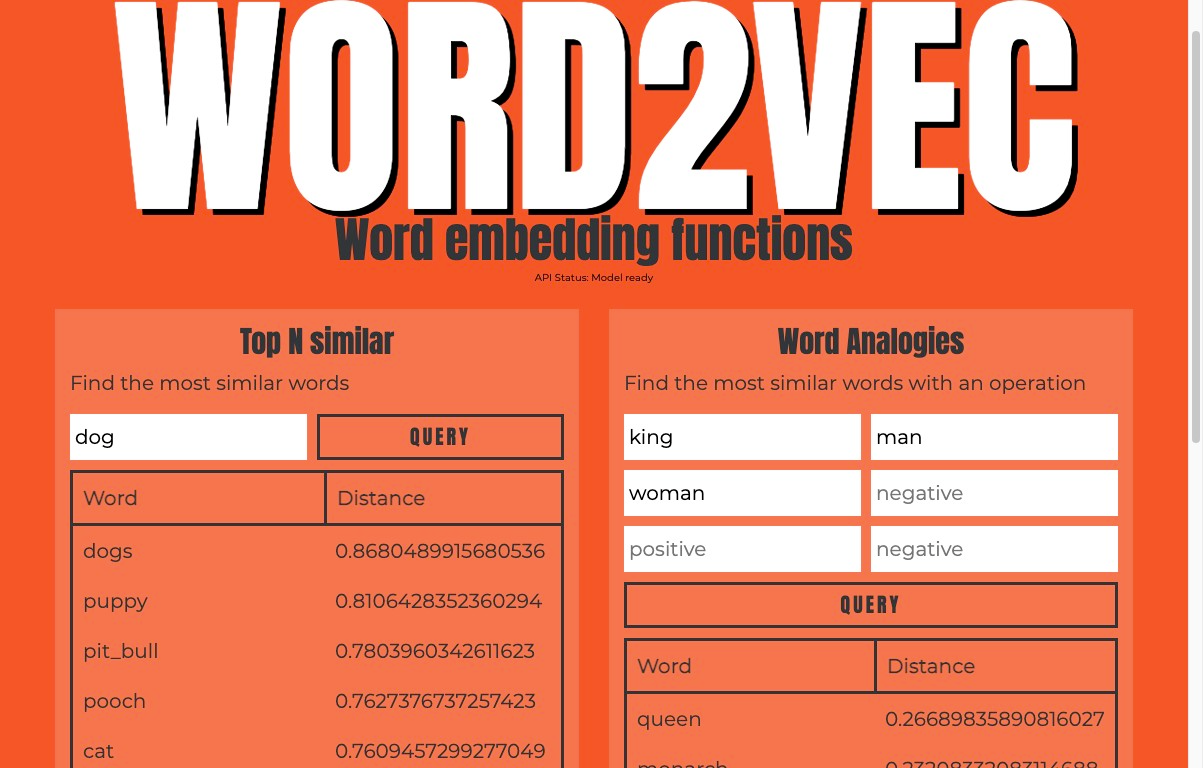- This app stopped working when Algorithmia closed it's services.
- It became too expensive for me to keep it running on GCP
- I'm not sure if I will bring it back, but I'm open to suggestions
- I decided to Archive it for now
Word Vector functions based on word2vec.
Model is trained using part of Google News dataset (about 100 billion words).
The model contains 300-dimensional vectors for 3 million words and phrases.
There are multiple functions available to query.
- vector: Get vectors for specific words
- distance: Calculate distances between the combinations of words
- closest: Get the closest n words and distances to a vector
- similar: Get the most similar n words and distances to one words
- analogy: Make word analogies based on positive and negative feedback
Returns the vector that represent a word.
| Parameter | Description |
|---|---|
| words | List of words |
Example:
{
"predict": {
"vector": {
"words": ["dog", "cat"]
}
}
}Output:
{
"cat": [0.001, 0.06, ...],
"dog": [0.02, 0.002, ...]
}Returns the distance between all the combinations (r=2) of multiple words.
| Parameter | Description |
|---|---|
| words | List of words |
Example:
{
"predict": {
"distance": {
"words": ["dog", "cat", "fish", "bird"]
}
}
}Output:
[
["dog", "cat", 0.7609457299277049],
["dog", "fish", 0.2331458338686121],
["dog", "bird", 0.4504405095095247],
["cat", "fish", 0.32425707394406234],
["cat", "bird", 0.5146262971059316],
["fish", "bird", 0.49408521392145377]
]Get the n (default=10) closest words and respective distances to a vector.
| Parameter | Description |
|---|---|
| vector | vector of size 300 as list of numbers |
| n | (default=10) Top N items to return |
Example:
{
"predict":{
"closest": {
"vector": [0.02, 0.006, ...], "n": 10
}
}
}Output:
For the vector that represents "dog", you can get this using query #1.
[
["dogs", 0.8680489915680536],
["puppy", 0.8106428352360295],
["pit_bull", 0.7803960342611623],
["pooch", 0.7627376737257423],
["cat", 0.7609457299277049],
["golden_retriever", 0.7500902073008441],
["German_shepherd", 0.7465174355312222],
["Rottweiler", 0.7437614773466921],
["beagle", 0.7418621650220392],
["pup", 0.7406910838103349]
]Get the n (default=10) similar words and distances to one
| Parameter | Description |
|---|---|
| word | Word to calculate distances |
| n | (default=10) Top N items to return |
Example:
{
"predict": {
"similar": {
"word": "dog",
"n": 3
}
}
}Output:
[
["dogs", 0.8680489915680536],
["puppy", 0.8106428352360294],
["pit_bull", 0.7803960342611623]
]| Parameter | Description |
|---|---|
| pos | List of positive words |
| neg | List of negative words |
| n | (default=10) Top N items to return |
Compute an analogy based positive words and negative words, for example: king - man + woman = queen
{
"predict": {
"analogy": {
"pos": ["king", "woman"],
"neg": ["man"],
"n": 5
}
}
}[
["queen", 0.26689835890816027],
["monarch", 0.23208332083114688],
["princess", 0.22131306095983244],
["crown_prince", 0.20620359683335132],
["prince", 0.20162396428463877]
]There are other functions that allows to query for the health and status of the API.
{"ping":""}returnstruewhen API is live, it doesn't load the model{"health":""}returns the status of the API from["live", "model_loaded"]{"load":""}triggers the loading of the model into memory, returnokwhen done{"debug":""}returns debug information about the API and environment

